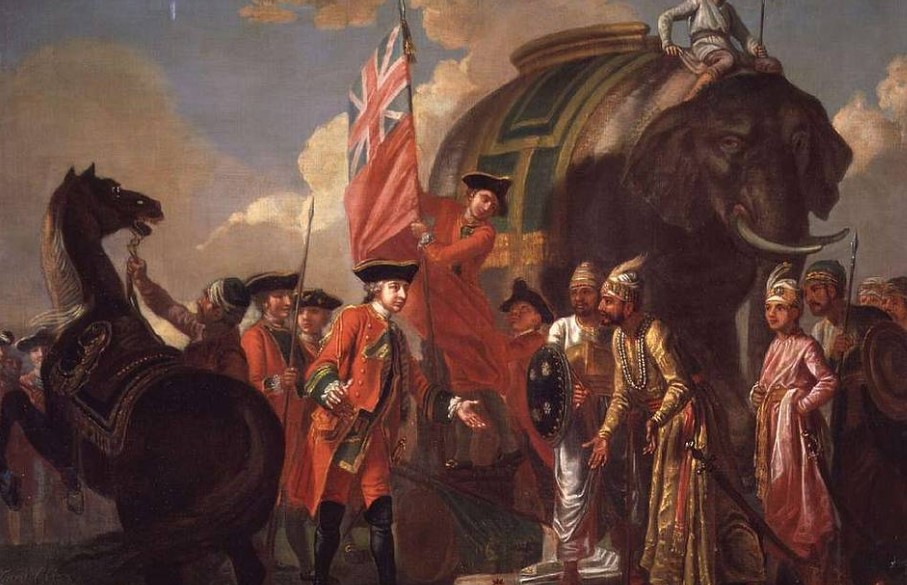
Modern History MCQs – 1 (Arrival of Europeans in India)
Most important multiple choice questions from the chapter – Arrival of Europeans in India MCQs.
Home » UPSC Study Materials » Prelims Express » Chapterwise MCQs » Modern History MCQs » Modern History MCQs – 15 (Communal Award and Poona Pact)
Communal Award and Poona Pact MCQs with answers and explanations for UPSC and Other examinations.
1. Consider the following statements about First Round Table Conference :
1. Ramsay MacDonald presided over it.
2. It was attended by a Congress delegation.
Which of the above statements is/are correct ?
(a) 1 only
(b) 2 only
(c) Both 1 & 2
(d) None of the above
Correct Answer – (a) 1 only
2. Consider the following statements about Round Table Conferences :
1. Bhimrao Ambedkar attended the First Round Table Conference.
2. Gandhi attended the second Round Table Conference.
Which of the above statements is/are correct ?
(a) 1 only
(b) 2 only
(c) Both 1 & 2
(d) None of the above
Correct Answer – (c) Both 1 & 2
3. Which of the following leaders participated in the 2nd Round Table Conference ?
1. Mahatma Gandhi
2. Sarojini Naidu
3. Madan Mohan Malviya
4. Rajendra Prasad
Select correct answer using code given below :
(a) 1 and 2
(b) 1 and 3
(c) 1,2 and 3
(d) 1, 3 and 4
Correct Answer – (c) 1,2 and 3
4. Who among the following declared the Communal Award ?
(a) Ramsay MacDonald
(b) Queen Victoria
(c) Lord Canning
(d) Lord Minto
Correct Answer – (a) Ramsay MacDonald
5. Which among the following communities were not allocated separate electorates by the Communal Award ?
(a) Muslims
(b) Buddhists
(c) Depressed Classes
(d) Sikhs
Correct Answer – (b) Buddhists
6. Mahatma Gandhi undertook fast unto death in 1932, mainly due to which among the following reasons :
(a) Round Table Conference failed to satisfy Indian political aspirations
(b) Congress and Muslim League had difference of opinion
(c) Separate electorates for depressed class in the Communal Award
(d) Bhagat Singh and Sukhdev were executed
Correct Answer – (c) Separate electorates for depressed class in the Communal Award
7. The Poona Pact (1932) was an agreement signed between who among the following ?
(a) Nehru and Ambedkar
(b) Gandhi and Ambedkar
(c) Malaviya and Ambedkar
(d) Gandhi and Nehru
Correct Answer – (b) Gandhi and Ambedkar
8. Consider the following statements about ‘Harijan Sewak Sangh’ :
1. It was founded by Bhimrao Ambedkar.
2. Ghanshyam Das Birla became the first President of Harijan Sevak Sangh.
Which of the above statements is/are correct ?
(a) 1 only
(b) 2 only
(c) Both 1 & 2
(d) None of the above
Correct Answer – (b) 2 only
9. ‘Harijan’ magazine was started by who among the following ?
(a) Jai Prakash Narayan
(b) Mahatma Gandhi
(c) B.R Ambedkar
(d) M.N. Roy
Correct Answer – (b) Mahatma Gandhi
10. Congress Socialist Party was formed by who among the following ?
(a) Acharya Narendra Dev & Jai Prakash Narayan
(b) Ganesh Shankar Vidyarthi & Mahatma Gandhi
(c) Pattam Thanu Pillai & Ghanshyam Das Birla
(d) M.N. Roy & Subhash Chandra Bose
Correct Answer – (a) Acharya Narendra Dev & Jai Prakash Narayan
11. Subhash Chandra Bose was elected as President of Indian National Congress for the first time in which among the following sessions ?
(a) Haripura Session
(b) Madras Session
(c) Tripuri Session
(d) Calcutta Session
Correct Answer – (a) Haripura Session
More questions are coming soon. Join us on Whatsapp for latest updates: Join CivilsCracker on Whatsapp

Most important multiple choice questions from the chapter – Arrival of Europeans in India MCQs.

Most important multiple choice questions from the chapter – Battle of Plassey and Battle of Buxar MCQs.

Most important multiple choice questions from the chapter – Social and Religious Reform Movements MCQs.

Most important multiple choice questions from the chapter – Anglo Mysore Wars and Anglo Maratha Wars MCQs.

Most important multiple choice questions from the chapter – Governor Generals of India MCQs.

Most important multiple choice questions from the chapter – Revolt of 1857 MCQs.

Most important multiple choice questions from the chapter – Organizations before Indian National Congress MCQs.

Most important multiple choice questions from the chapter – Important Sessions of Indian National Congress MCQs.

Most important multiple choice questions from the chapter – Partition of Bengal and Swadeshi Movement MCQs.

Most important multiple choice questions from the chapter – Surat Split and Lucknow Pact MCQs.

Most important multiple choice questions from the chapter – Arrival of Gandhi and Jallianwala Bagh Massacre MCQs.

Most important multiple choice questions from the chapter – Khilafat and Non Cooperation Movement MCQs.

Most important multiple choice questions from the chapter – Simon Commission and Nehru Report MCQs.

Most important multiple choice questions from the chapter – Civil Disobedience Movement MCQs.

Most important multiple choice questions from the chapter – Individual Satyagraha and Cripps Mission MCQs.

Most important multiple choice questions from the chapter – Quit India Movement MCQs.

Most important multiple choice questions from the chapter – Indian National Army and Royal Indian Navy Mutiny MCQs.

Most important multiple choice questions from the chapter – Cabinet Mission and Formation of Constituent Assembly MCQs.

Most important multiple choice questions from the chapter – Independence and Partition of India MCQs.
We are adding new Notes, Chapterwise MCQs, Quizzes, Previous Years Questions everyday
We are adding new Notes, Chapterwise MCQs, Quizzes, Previous Years Questions everyday